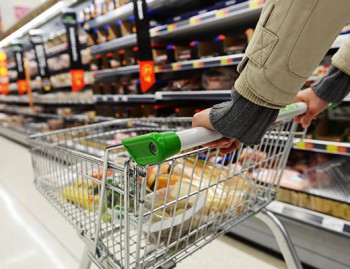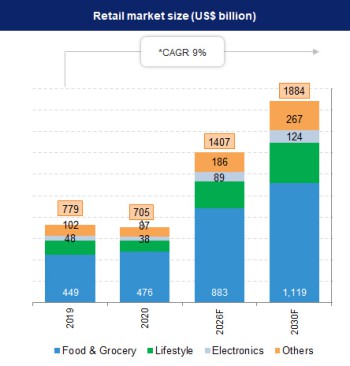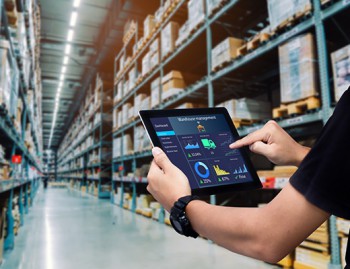INTRODUCTION
Indian retail industry has emerged as one of the most dynamic and fast-paced industries due to the entry of several new players. It accounts for over 10% of the country’s gross domestic product (GDP) and around eight% of the employment. India is the world’s fifth-largest global destination in the retail space.
India ranked 73 in the United Nations Conference on Trade and Development’s Business-to-Consumer (B2C) E-commerce Index 2019. India is the world’s fifth-largest global destination in the retail space and ranked 63 in World Bank’s Doing Business 2020.
India is the world’s fifth-largest global destination in the retail space. In FDI Confidence Index, India ranked 16 (after US, Canada, Germany, United Kingdom, China, Japan, France, Australia, Switzerland, and Italy).

MARKET SIZE

As per Kearney Research, India’s retail industry is projected to grow at a slower pace of 9% over 2019-2030, from US$ 779 billion in 2019 to US$ 1,407 billion by 2026 and more than US$ 1.8 trillion by 2030.
Revenue of India’s offline retailers, also known as brick and mortar (B&M) retailers, is expected to increase by Rs. 10,000-12,000 crore (US$ 1.39-2.77 billion) in FY20. India’s direct selling industry would be valued at US$ 2.14 billion by the end of 2021.
According to the Retailers Association of India (RAI), the retail industry achieved 93% of pre-COVID sales in February 2021; consumer durables and quick service restaurants (QSR) increased by 15% and 18% respectively.
After an unprecedented decline of 19% in the January-March 2020 quarter, the FMCG industry displayed signs of recovery in the July-September 2020 quarter with a y-o-y growth of 1.6%. The growth witnessed in the fast-moving consumer goods (FMCG) sector was also a reflection of positivity recorded in the overall macroeconomic scenario amid opening of the economy and easing of lockdown restrictions.
E-Retail has been a boon during the pandemic and according to a report by Bain & Company in association with Flipkart ‘How India Shops Online 2021’ the e-retail market is expected to grow to US$ 120-140 billion by FY26, increasing at approximately 25-30% p.a. over the next 5 years. India has the third-highest number of e-retail shoppers (only behind China, the US). The new-age logistics players are expected to deliver 2.5 billion Direct-to-Consumer (D2C) shipments by 2030. The Ayurveda Company (TAC), a direct-to-consumer (D2C) beauty and wellness brand, has raised US$ 3 million from Wipro Consumer Care Ventures, to expand its production capabilities and enter the retail sector. Online used car transaction penetration is expected to grow by 9x in the next 10 years. During the festival period in 2020, Amazon, Flipkart and various vertical players sold goods worth US$ 9 billion despite the pandemic onslaught.
DEVELOPMENT SCENARIO
Retail tech companies supporting the retail sector with services such as digital ledgers, inventory management, payments solutions, and tools for logistics and fulfillment are taking off in India. In the first nine months of 2021, investors pumped in US$ 843 million into 200 small and mid-sized retail technology companies, which is an additional 260% of capital compared to the entire 2020.
91 Squarefeet, a retail store development business, has worked with over two dozen companies, including Tata, Aditya Birla Group, and Reliance Retail, illustrating the quick pace with which brick-and-mortar stores are being opened.
In March 2022, Reliance Brands has bought the India franchisee rights and the current Sunglass Hut retail network from DLF Brands.
DLF would invest about Rs. 2,000 crore (US$ 262.2 million) in Gurugram and Goa to build two new retail complexes.
In November 2021, Department for Promotion of Industry and Internal Trade announced that it is working on a regulatory compliance portal to minimise burdensome compliance processes between industries and the government.
In October 2021, retailers in India increased by 14% compared with last year
In September 2021, New Delhi-based e-commerce enablement startup GoKwik raised US$ 5.5 million through Matrix Partners India. Dukaan, another startup that helps businesses digitise operations, received a US$ 11 million investment led by 640 Oxford Ventures.
The Indian retail trading has received Foreign Direct Investment (FDI) equity inflow totalling US$ 3.61 billion during April 2000- June 2021, according to Department for Promotion of Industry and Internal Trade (DPIIT).
IWith the rising need for consumer goods in different sectors including consumer electronics and home appliances, many companies have invested in the Indian retail space in the past few months.
India’s retail sector attracted US$ 6.2 billion from various private equity and venture capital funds in 2020.
According to a report by PGA Labs and Knowledge Capital, investors had put in US$ 1.4 billion into D2C companies between 2014 and 2020. The sector recorded an investment of ~US$ 417 million in 2020.
In October 2021, Reliance announced plan to launch 7-Eleven Inc.’s convenience stores in India.
In October 2021, Realme launched 100 new exclusive stores across India to expand and strengthen its footprint in the country.
In October 2021, Reliance Retail introduced Freshpik, a new experiential gourmet food store in India, to expand its grocery segment in the ultra-premium category.
In October 2021, Plum, the direct-to-consumer beauty & personal care brand, announced plan to launch >50 offline stores across India (by 2023) to expand its customer base.
In July 2021, Dyson announced to increase its retail presence to 12 stores.
Tanishq, Shoppers Stop and Bestseller India (sells fashion brands Vero Moda, ONLY and Jack & Jones) plan to add 10-35 stores in FY22.
In 2021, Lenskart received US$ 315 million funding from Falcon Edge Capital, Temasek Holdings, KKR. The company plans to use the proceeds to expand its retail footprint in Southern India.
Flipkart hired 23,000 individuals in India between March and May 2021 in various capacities across its supply chain, including delivery executives, to strengthen the supply chain.
In May 2021, Big Bazaar rolled out its two-hour delivery service in small cities, such as Bhopal, Mangalore, Raipur, Ranchi, Guwahati, Kanpur, Lucknow, and Varanasi, and recorded a boost in orders over the past weeks.
In April 2021, Flipkart expanded its hyperlocal delivery service Quick to six new cities including Delhi, Gurugram, Ghaziabad, Noida, Hyderabad, and Pune as the demand for essential goods on e-commerce platforms surges amid the second wave of the pandemic.
GOVERNMENT INITIATIVES
The Government of India has taken various initiatives to improve the retail industry in India. Some of them are listed below:
- In October 2021, the RBI announced plans for a new framework for retail digital payments in offline mode to accelerate digital payment adoption in the country.
- In July 2021, the Andhra Pradesh government announced retail parks policy 2021-26, anticipating targeted retail investment of Rs. 5,000 crore (US$ 674.89 million) in the next five years.
- Government may change Foreign Direct Investment (FDI) rules in food processing in a bid to permit E-commerce companies and foreign retailers to sell Made in India consumer products.
- Government of India has allowed 100% FDI in online retail of goods and services through the automatic route, thereby providing clarity on the existing businesses of E-commerce companies operating in India.
- The government’s focus to improve digital infrastructure in Tier 2 and Tier 3 markets would be favourable to the sector.
- The Minister of MSME announced inclusion of retail and wholesale trades as MSMEs. Retail and wholesale trade will now get the benefit of priority sector lending under the RBI guidelines.
ROAD AHEAD
E-commerce is expanding steadily in the country. Customers have the ever-increasing choice of products at the lowest rates. E-commerce is probably creating the biggest revolution in retail industry, and this trend is likely to continue in the years to come. Retailers should leverage digital retail channels (E-commerce), which would enable them to spend less money on real estate while reaching out to more customers in tier II and tier III cities.
Online retail market in India is projected to reach US$ 350 billion by 2030 from an estimated US$ 55 billion in 2021, due to rising online shoppers in the country. In 2020, the most common payment methods online were digital wallets (40%), followed by credit cards (15%) and debit cards (15%). Online penetration of retail is expected to reach 10.7% by 2024 versus 4.7% in 2019.
Nevertheless, long-term outlook for the industry looks positive, supported by rising income, favourable demographics, entry of foreign players, and increasing urbanisation.

Note: Conversion rate used in October 2021, Rs. 1 = US$ 0.013
References: Media Reports, Press Releases, Deloitte report, Department of Industrial Policy and Promotion website, Consumer Leads report by FICCI and Deloitte - October 2019
Disclaimer: This information has been collected through secondary research and IBEF is not responsible for any errors in the same.
Retail India

Industry Contacts
- Retailers Association of India
- The Franchising Association of India